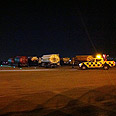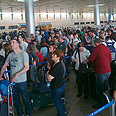

Air traffic at Israel's Ben Gurion International Airport partially resumed Thursday night, after one of the most chaotic days ever noted by the country's gateway.
Earlier, a contamination detected at the airport's fuel terminal forced it to ground all planes, bringing air traffic over Israel to a virtual standstill. The reason for the contamination has yet to be determined.
Dozens of tankers were sent to the Pi Glilot Fuel Depot and then hauled jet fuel to the airport, were planes began taking off, sometimes as little as five minutes apart.
The IDF sent five fuel tankers to the airport as well, granting a request to that effect by Transportation Minister Yisrael Katz.
Still, some of the planes were instructed to fly to international airports in Jordan, Greece and Cyprus, so they could refuel properly.
Additional tankers have been sent to Eilat's airfield, where Israeli planes have been grounded since noon.
"All the right decisions were made, starting with grounding flights and setting up the situation room, to finding alternative fueling methods," the Israel Airport Authority said.
Still, the problem – which has yet to be fully identified – is not expected to be resolved before next week, causing a bottleneck in Israel's skies. A Ben Gurion Airport official said delays are expected for all flights.
The Airport Authority has decided to prioritize the refueling process, saying east-bound flights headed to destinations such as Thailand would be given priority simply because they are unable to stop and refuel in neighboring counties; while flights headed to Europe have the ability to stop in Cyprus or Greece.
Due to the gridlock, the airport will allow for takeoffs all through the night.
'Damage estimated in the millions'
The damage caused by the fuel contamination is estimated at millions of dollars. According to aviation experts, the airlines – which are the ones bearing the initial financial brunt – are likely to sue the State and the jet fuel providers for damages.
Despite extensive testing by the Israel Institute of Energy and Environment, the contaminating agent has yet to be identified. The institute has been able, however, to rule out the possibility of a biological agent. Samples of the contaminated fuel have been sent to a German laboratory for further analysis.
According to professional experts, jet fuel – which is carried by tankers from the airport's fueling terminal to the planes – is tested daily.
"Seeing how jet fuel is funneled underground, through pipes that are sometimes hundreds of yards long, sometimes small cracks may form in the pipes, allowing contaminating agents in," one expert explained. "Planes are highly susceptible to such contaminations, which are often bacterial.
"The filters are supposed to prevent such things and in any case, chemical tests are performed on the fuel daily, and the smallest abnormality is enough to mandate grounding all airplanes."
Meanwhile, Minister Katz expressed concerns that the fuel contamination may also affect public transportation fuel reserves, saying his ministry has already received complaints from both Egged and Dan.
Yoav Zitun contributed to this report
- Follow Ynetnews on Facebook















